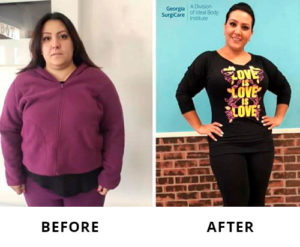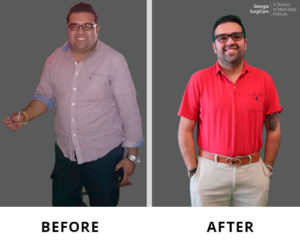Eating a healthy diet and keeping fit through exercise will help most people lose or maintain a weight goal. For others, obtaining a healthy weight is a struggle. Some people consider bariatric surgery to help them achieve their weight loss goals and you may be among them. Today we are going to talk about gastric sleeve vs. gastric bypass, how the procedures are done and what to expect during recovery.
Two of the most popular and effective options to lose massive weight are gastric sleeve surgery and gastric bypass surgery but which is right for you? Either surgery – gastric sleeve vs. gastric bypass – coupled with some lifestyle changes, will help you lose weight and become healthier.
Gastric Bypass Vs. Gastric Sleeve: How Do They Compare?
Gastric sleeve surgery or “vertical sleeve gastrectomy” as it is referred to in the medical community, is a procedure that results in the permanent removal of about 80% of the stomach. After the removal, the surgeon stitches the remaining stomach into a pouch-like sleeve that resembles the shape of a banana. The surgery is done laparoscopically through several small incisions made in the upper part of the abdomen.


Gastric bypass surgery or Roux-en-y, named for the Swiss surgeon Ceaser Roux, is a procedure that creates a small pouch from your stomach and connects it directly to a section of your small intestine. The surgery is performed laparoscopically through 5 or 6 abdominal incisions.
When food is eaten, it skips most of your stomach as well as a large portion of your small intestine greatly limiting caloric absorption. You feel “full” with much smaller portions and, subsequently, lose weight. Gastric bypass surgery is most often reserved for patients who have tried everything else or may have a life-threatening condition that requires them to lose weight.
Both gastric bypass surgery and gastric sleeve surgery are done laparoscopically, however, the gastric bypass procedure is more complicated and normally requires a longer recovery time. Proper aftercare, including getting plenty of rest, following provided aftercare protocols, limiting your activity, and following dietary guidelines will assist your body in recovering faster
Things to Know As You Recover from Bariatric Surgery
Both surgeries reduce the size of the stomach so it will be necessary to adjust your eating habits significantly.
- You may not be allowed to eat for a few days to give your system some rest and time to heal.
- For approximately two weeks, you will be instructed to maintain a diet of “liquids only” accompanied by protein supplements. Your body will need to adjust to frequent small meals throughout the day and you will have to pace yourself accordingly.
- Week three you will start introducing soft foods and vitamins and build up to proteins over the next weeks and months. Read more about Gastric Sleeve Diet: What To Eat or Not To Eat After The Surgery?
- You will also have to re-learn how much water and/or liquid you can drink at one time. If you are accustomed to chugging large amounts of water in one sitting, every day to get in your recommended daily amount, you are going to have to make adjustments.
- Remember, your stomach is now only a small pouch, so drinking or eating too much, too fast can cause stomach aches, nausea, or pain. Maintaining a healthy balanced diet and following the dietary plan the surgeon will provide to you is vital in your recovery process and continued health.
In addition to your diet, it will be important for you to get exercise at least 5 out of 7 days a week. If you have any physical limitations, you may need to get some assistance in creating a plan that works best for you.
Related: The Ideal Weight Guide: What Is a Gastric Balloon?
If you are considering bariatric surgery and have more questions about gastric bypass vs. gastric sleeve, please contact our offices. One of our specialists will be happy to speak with you in more detail. Each procedure has pros and cons; family history, current overall health, and willingness to make lifestyle changes will all factor into which is best for you.
Angelina Postoev, MD, FACS, a triple board-certified cosmetic surgeon, and Christopher Ibikunle, MD, FACS, offer gastric bypass surgery and gastric sleeve surgery to patients in Lawrenceville, Suwanee, Johns Creek, Buckhead, and other surrounding areas of Atlanta, Georgia.




I had gastric bypass surgery in 1998. I lost weight and kept it off for many years but now my weight is back. My insurance covered some of the total cost. I am interested in your gastric sleeve procedure and I would like to know if you accept health insurance for that procedure. I am also having hernia surgery on the 18th
Thank you,
Wendolyn Peters
Wow, I never knew that 80% of your stomach will be removed if a gastric sleeve surgery is done. My friend is very insecure about his weight and I always encourage him to workout. He can be stubborn and impatient at times because he doesn’t want to do anything about his insecurities. That being said, I’ll suggest this to him and when he agrees, we’ll make sure find the best doctor in town who can conduct a successful gastric sleeve surgery for him.